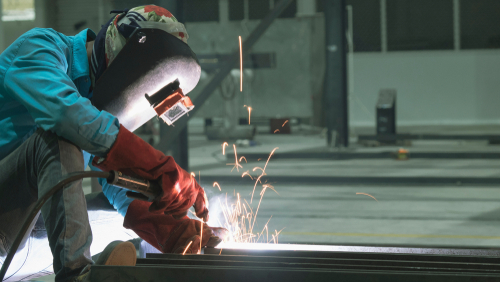The Evolution of Metal Fabrication: Past, Present, and Future
April 23, 2024 2:20 pm Leave your thoughts
Metal fabrication has played a significant role in human history, dating back to the Bronze Age when people first began to shape metal for tools and weapons. Over time, advancements in metallurgy and manufacturing techniques have revolutionized the way metal components are produced. The Industrial Revolution in the 18th and 19th centuries marked a turning point in metal fabrication with the introduction of powered machinery and mass production techniques. Today, metal fabrication is a vital sector in numerous industries, including construction, automotive, aerospace, and more.
Key Technological Advancements and Their Impacts
The development of key technological advancements has greatly influenced the evolution of metal fabrication. One of the most significant advancements was the introduction of computer-aided design (CAD) and computer-aided manufacturing (CAM) systems in the late 20th century. These technologies revolutionized the design and production processes, allowing for more precise and efficient fabrication of metal components. CNC (Computer Numerical Control) machines further automated fabrication processes, enabling manufacturers to create complex and intricate parts with high precision and consistency.
Another key advancement in metal fabrication is the adoption of additive manufacturing, also known as 3D printing. This technology has opened up new possibilities for creating metal components layer by layer, without the need for traditional machining or tooling. Additive manufacturing offers greater design freedom, reduced waste, and faster prototyping, making it a game-changer in the industry. Additionally, advancements in materials science have led to the development of new alloys and composites that offer improved strength, durability, and performance in various applications.
Current Trends Shaping the Industry
Several trends are currently shaping the metal fabrication industry and driving innovation in manufacturing processes. One of the prominent trends is the growing emphasis on sustainability and environmental responsibility. Metal fabricators are increasingly adopting eco-friendly practices such as recycling scrap metal, reducing energy consumption, and implementing green technologies to minimize their environmental impact. Sustainability is not only a moral imperative but also a competitive advantage for companies looking to meet the demands of eco-conscious consumers and regulatory requirements.
Another trend influencing the industry is the rise of automation and robotics in metal fabrication. Automated systems and robotics are being integrated into fabrication processes to increase efficiency, productivity, and safety. Robots are used for welding, cutting, bending, and other fabrication tasks that require precision and repeatability. Automation not only reduces labor costs and cycle times but also improves overall quality control and consistency in production. As the demand for faster turnaround times and higher product quality continues to grow, automation plays a crucial role in meeting these requirements.
Future Outlook and Emerging Technologies
Looking ahead, the future of metal fabrication is filled with exciting possibilities as new technologies continue to emerge and transform the industry. One of the emerging technologies set to revolutionize metal fabrication is artificial intelligence (AI) and machine learning. AI-powered systems can analyze vast amounts of data, optimize production processes, predict maintenance needs, and improve overall efficiency in metal fabrication. By leveraging AI, manufacturers can make data-driven decisions, reduce downtime, and enhance productivity.
Another promising technology on the horizon is nanotechnology, which involves manipulating materials at the nanoscale to create new properties and functionalities. Nanomaterials are being explored for their potential applications in metal fabrication, such as improving strength, corrosion resistance, and conductivity. By incorporating nanotechnology into metal components, manufacturers can enhance performance, durability, and sustainability in various industries.
Furthermore, the adoption of Internet of Things (IoT) technology is poised to revolutionize metal fabrication by connecting machines, sensors, and devices in a seamless network. IoT enables real-time monitoring, remote diagnostics, predictive maintenance, and data analytics, allowing manufacturers to optimize operations, reduce waste, and improve overall efficiency. By harnessing the power of IoT, metal fabricators can achieve greater visibility and control over their production processes, leading to enhanced productivity and cost savings.
Summary
The evolution of metal fabrication has been shaped by a rich history of technological advancements, driving progress and innovation in the industry. From the early days of manual craftsmanship to the modern era of advanced automation and additive manufacturing, metal fabrication has come a long way in meeting the demands of diverse industries. As we look to the future, emerging technologies such as artificial intelligence, nanotechnology, and IoT promise to unlock new opportunities and redefine the possibilities in metal fabrication. By embracing innovation and staying ahead of trends, metal fabricators can continue to thrive and succeed in the ever-evolving landscape of manufacturing.
Need Steel Fabricators in Hermiston, OR?
NW Metal Fabricators, Inc. is a family-owned business that has been servicing customers in Hermiston, Oregon since 1986. We have more than 100 years of experience in the food-processing industry and specialize in the custom production of storage bins, conveyors, catwalks, handrails, gates, storage tanks, water heater tanks, sanitary piping, steam piping, and trailer truck hitches. NW Metal Fabricators, Inc. is an accredited member of the local Chamber of Commerce. We are a dedicated business where quality always comes first. Our customers know that they can count on us to make sure that their products are hand-crafted to meet their specifications. Contact us today to learn more about what we can do for you!
Categorised in: Metal Fabrication
This post was written by admin
